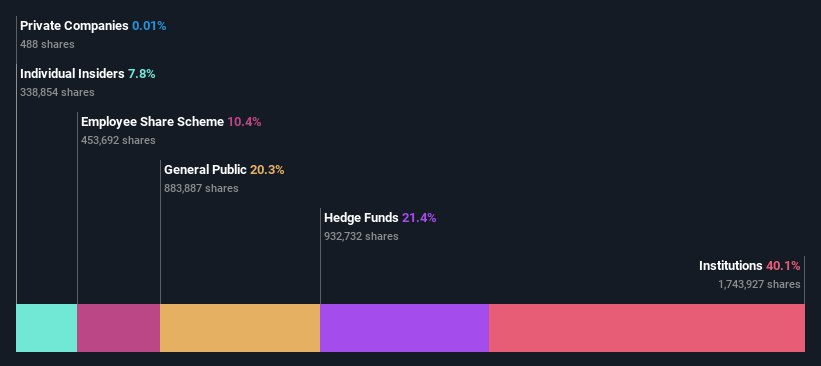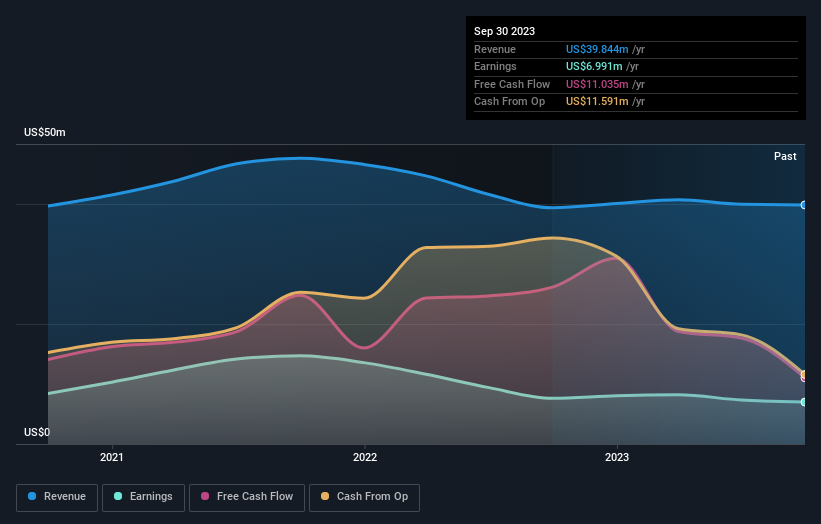HMN Financial, Inc.'s (NASDAQ:HMNF) large institutional owners must be happy as stock continues to impress, up 11% over the past week
Key Insights
Institutions' substantial holdings in HMN Financial implies that they have significant influence over the company's share price
53% of the business is held by the top 7 shareholders
Past performance of a company along with ownership data serve to give a strong idea about prospects for a business
Every investor in HMN Financial, Inc. (NASDAQ:HMNF) should be aware of the most powerful shareholder groups. The group holding the most number of shares in the company, around 40% to be precise, is institutions. Put another way, the group faces the maximum upside potential (or downside risk).
Last week’s 11% gain means that institutional investors were on the positive end of the spectrum even as the company has shown strong longer-term trends. The one-year return on investment is currently 11% and last week's gain would have been more than welcomed.
Let's take a closer look to see what the different types of shareholders can tell us about HMN Financial.
See our latest analysis for HMN Financial
What Does The Institutional Ownership Tell Us About HMN Financial?
Institutions typically measure themselves against a benchmark when reporting to their own investors, so they often become more enthusiastic about a stock once it's included in a major index. We would expect most companies to have some institutions on the register, especially if they are growing.
As you can see, institutional investors have a fair amount of stake in HMN Financial. This suggests some credibility amongst professional investors. But we can't rely on that fact alone since institutions make bad investments sometimes, just like everyone does. If multiple institutions change their view on a stock at the same time, you could see the share price drop fast. It's therefore worth looking at HMN Financial's earnings history below. Of course, the future is what really matters.
It would appear that 21% of HMN Financial shares are controlled by hedge funds. That catches my attention because hedge funds sometimes try to influence management, or bring about changes that will create near term value for shareholders. The company's largest shareholder is HMN Financial, Incorporated, ESOP, with ownership of 10%. Meanwhile, the second and third largest shareholders, hold 10% and 7.8%, of the shares outstanding, respectively. Additionally, the company's CEO Bradley Krehbiel directly holds 3.6% of the total shares outstanding.
We also observed that the top 7 shareholders account for more than half of the share register, with a few smaller shareholders to balance the interests of the larger ones to a certain extent.
Researching institutional ownership is a good way to gauge and filter a stock's expected performance. The same can be achieved by studying analyst sentiments. We're not picking up on any analyst coverage of the stock at the moment, so the company is unlikely to be widely held.
Insider Ownership Of HMN Financial
While the precise definition of an insider can be subjective, almost everyone considers board members to be insiders. The company management answer to the board and the latter should represent the interests of shareholders. Notably, sometimes top-level managers are on the board themselves.
Insider ownership is positive when it signals leadership are thinking like the true owners of the company. However, high insider ownership can also give immense power to a small group within the company. This can be negative in some circumstances.
Our most recent data indicates that insiders own some shares in HMN Financial, Inc.. In their own names, insiders own US$7.9m worth of stock in the US$102m company. It is good to see some investment by insiders, but we usually like to see higher insider holdings. It might be worth checking if those insiders have been buying.
General Public Ownership
With a 20% ownership, the general public, mostly comprising of individual investors, have some degree of sway over HMN Financial. While this size of ownership may not be enough to sway a policy decision in their favour, they can still make a collective impact on company policies.
Next Steps:
It's always worth thinking about the different groups who own shares in a company. But to understand HMN Financial better, we need to consider many other factors.
I like to dive deeper into how a company has performed in the past. You can find historic revenue and earnings in this detailed graph.
If you would prefer check out another company -- one with potentially superior financials -- then do not miss this free list of interesting companies, backed by strong financial data.
NB: Figures in this article are calculated using data from the last twelve months, which refer to the 12-month period ending on the last date of the month the financial statement is dated. This may not be consistent with full year annual report figures.
Have feedback on this article? Concerned about the content? Get in touch with us directly. Alternatively, email editorial-team (at) simplywallst.com.
This article by Simply Wall St is general in nature. We provide commentary based on historical data and analyst forecasts only using an unbiased methodology and our articles are not intended to be financial advice. It does not constitute a recommendation to buy or sell any stock, and does not take account of your objectives, or your financial situation. We aim to bring you long-term focused analysis driven by fundamental data. Note that our analysis may not factor in the latest price-sensitive company announcements or qualitative material. Simply Wall St has no position in any stocks mentioned.

 Yahoo Finance
Yahoo Finance 

